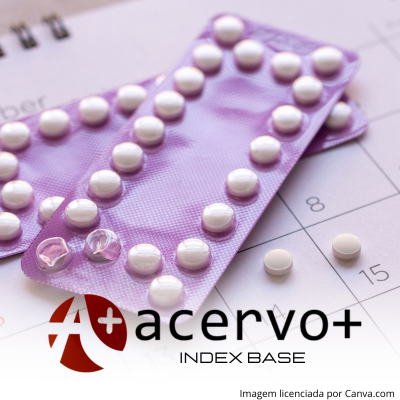Relações entre o uso de anticoncepcional hormonal e o desenvolvimento de câncer de mama: controvérsias na literatura
##plugins.themes.bootstrap3.article.main##
Resumo
Objetivo: Analisar as controvérsias da relação entre o uso de anticoncepcional hormonal oral e o câncer de mama. Revisão bibliográfica: O anticoncepcional hormonal oral é um método contraceptivo eficaz, possui baixo custo e está disponível no sistema único de saúde. Entretanto, a atual propagação de notícias falsas nas redes sociais associam constantemente os anticoncepcionais hormonais ao aumento da incidência de câncer (CA) de mama, originando um medo irracional na população. A literatura científica demonstra como esse assunto é controverso: alguns estudos descrevem relação positiva; outros descrevem que não há nenhuma. Os artigos concordam que outros fatores de risco como idade, predisposição genética, obesidade e hábitos de vida possuem maior relevância no desenvolvimento de CA de mama do que o próprio anticoncepcional. Dessa forma, o profissional da saúde deve adaptar um plano singular, instruir sua paciente com as reais informações científicas sobre os métodos contraceptivos e escolher em conjunto de acordo com suas individualidades. Considerações finais: Há muitas controvérsias envolvendo os riscos do uso de anticoncepcional hormonal no desenvolvimento do câncer de mama, não sendo unânime essa relação na literatura estudada.
##plugins.themes.bootstrap3.article.details##
Copyright © | Todos os direitos reservados.
A revista detém os direitos autorais exclusivos de publicação deste artigo nos termos da lei 9610/98.
Reprodução parcial
É livre o uso de partes do texto, figuras e questionário do artigo, sendo obrigatória a citação dos autores e revista.
Reprodução total
É expressamente proibida, devendo ser autorizada pela revista.
Referências
2. BONFIGLIO R e DI PIETRO ML. The impact of oral contraceptive use on breast cancer risk: State of the art and future perspectives in the era of 4P medicine. Seminars in Cancer Biology, 2021; 72: 11–18.
3. BYRNE C, et al. Mammographic Density Change With Estrogen and Progestin Therapy and Breast Cancer Risk. Journal of the National Cancer Institute, 2017; 109(9).
4. BREAST. 2020. In: Global Cancer Observatory. Disponível em: https://gco.iarc.fr/today/data/factsheets/cancers/20-Breast-fact-sheet.pdf. Acessado em: 8 de fevereiro de 2023.
5. CARDOSO MPC. Associação entre câncer de mama e uso de contraceptivos orais de mulheres em idade fértil. Tese (Doutorado em Ciências Médico-Cirúrgicas) - Faculdade de Medicina, Universidade Federal do Ceará, Fortaleza, 2020, 58 p.
6. COSTA LS, et al. Fatores de risco relacionados ao câncer de mama e a importância da detecção precoce para a saúde da mulher. Revista Eletrônica Acervo Científico, 2021; 31: e8174.
7. COUTO PLS, et al. Evidências dos efeitos adversos no uso de anticoncepcionais hormonais orais em mulheres: uma revisão integrativa. Enfermagem em Foco, 2020. 11(4).
8. DORCHAK JA, et al. The Impact of Hormonal Contraceptives on Breast Cancer Pathology. Hormones & Cancer, 2018; 9(4): 240–253.
9. HUBER D, et al. Use of oral contraceptives in BRCA mutation carriers and risk for ovarian and breast cancer: a systematic review. Archives of Gynecology and Obstetrics, 2020; 301: 875–884.
10. JUREMA KKC e JUREMA, HC. Efeitos Colaterais a longo prazo associados ao uso de Anticoncepcionais Hormonais Orais. Revista Cereus, 2021; 13: 124-135.
11. KAMANI M, et al. Review of the literature on combined oral contraceptives and cancer. ecancermedicalscience, 2022; 16: 1416.
12. ŁUKASIEWICZ S, et al. Breast cancer—epidemiology, risk factors, classification, prognostic markers, and current treatment strategies—an updated review. Cancers, 2021; 13: 4287.
13. MARSDEN J. Hormonal contraception and breast cancer, what more do we need to know? Post Reproductive Health, 2017; 23(3): 116–127.
14. MØRCH LS, et al. Contemporary Hormonal Contraception and the Risk of Breast Cancer. New England Journal of Medicine, 2017; 377: 2228–2239.
15. OLIVEIRA ALR, et al. Fatores de risco e prevenção do câncer de mama. Cadernos da Medicina-UNIFESO, 2020; 2: 135-145.
16. PARK J, et al. Oral contraceptives and risk of breast cancer and ovarian cancer in women with a BRCA1 or BRCA2 mutation: a meta-analysis of observational studies. Carcinogenesis, 2022; 43:231–242.
17. PEREIRA BMB, et al. Terapia hormonal e câncer de mama. Rev Bras Mastologia, 2017; 27: 15-20.
18. ROMANO F, et al. Estudo epidemiológico e intervencionista sobre uso de anticoncepcionais como método contraceptivo. Revista da Faculdade de Ciências Médicas de Sorocaba, 2020; 22: 4(146–50).
19. SCHRIJVER L, et al. Oral Contraceptive Use and Breast Cancer Risk: Retrospective and Prospective Analyses From a BRCA1 and BRCA2 Mutation Carrier Cohort Study. JNCI Cancer Spectrum, 2018; 2: pky023.
20. VAN HOFTEN C, et al. Long-term oral contraceptive use increases breast cancer risk in women over 55 years of age: the DOM cohort. International Journal of Cancer, 2000; 87(4): 591–594.
21. WESTHOFF CL, PIKE MC. Hormonal contraception and breast cancer. Contraception, 2018; 98: 171–173.
22. ZOLFAROLI I, et al. The action of estrogens and progestogens in the young female breast. European Journal of Obstetrics & Gynecology and Reproductive Biology, 2018; 230: 204–207.

